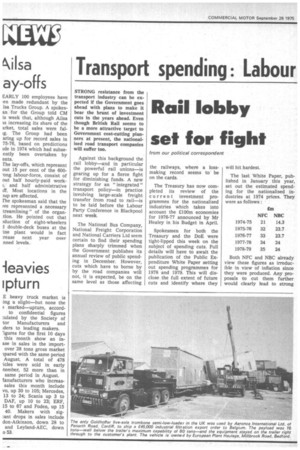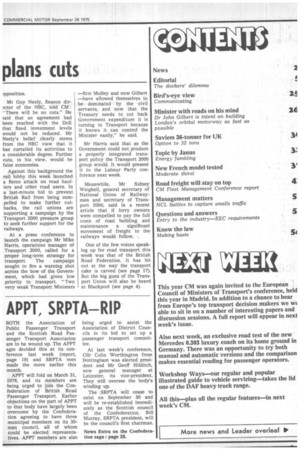Transport spending: Labour plans cuts
Page 4

Page 5

If you've noticed an error in this article please click here to report it so we can fix it.
Rail lobby set for fight
from our political correspondent
STRONG resistance from the transport industry can be expected if the Government goes ahead with plans to make it bear the brunt of investment cuts in the years ahead. Even though British Rail seems to be a more attractive target to Government cost-cutting planners at present, the nationalised road transport companies will suffer too.
Against this background the rail lobby—and in particular the powerful rail unions—is gearing up for a fierce fight for diminishing funds. A new strategy for an " integrated " transport policy—in practice involving large-scale freight transfer from road to rail—is to be laid before the Labour Party Conference in Blackpool next week.
The National Bus Company, National Freight Corporation and National Carriers Ltd seem certain to find their spending plans sharply trimmed when the Government publishes its annual review of public spending in December. However, cuts which have to borne by by the road companies will not, it is expected, be on the same level as those affecting the railways, where a lossmaking record seems to be on the cards.
The Treasury has now completed its review of the current investment programmes for the nationalised industries which takes into account the £100m economies for 1976-77 announced by Mr Healey in his Budget in April.
Spokesmen for both the Treasury and the DoE were tight-lipped this week on the subject of spending cuts. Full details will have to await the publication of the Public Expenditure White Paper setting out spending programmes for 1978 and 1979. This will disclose •the full extent of future cuts and identify where they will hit hardest.
The last White Paper, published in January this year, set out the estimated spending for the nationalised industries at 1974 prices. They were as follows : Both NFC and NBC already view these figures as irreducible in view of inflation since they were produced. Any proposals to cut them further would clearly lead to strong )pposition.
Mr Guy Neely, finance dir?.ctor of the NBC, told CM: 'There will be no cuts." He 3aid that an agreement had been reached with the DoE that fixed investment levels would not be reduced. Mr Neely's belief clearly stems from the NBC view that it has curtailed its activities to a considerable degree. Further cuts, in his view, would be false economies.
Against this background the rail lobby this week launched a fierce attack on road hauliers and other road users. In a last-minute bid to prevent British Rail from being compelled to make further cutbacks, the rail unions are supporting a campaign by the Transport 2000 pressure group to seek further support for the railways.
At a press conference to launch the campaign Mr Mike Harris, operations manager of Transport 2000, called for a proper long-term strategy for transport. The campaign sought to fire a warning shot across the bow of the Government, which had given low priority to transport. "Two very weak Transport Ministers —first Malley and now Gilbert —have allowed themselves to be dominated by the civil servants, and now that the Treasury needs to cut back Government expenditure it is turning to Transport because it knows it can control the Minister easily," he said.
Mr Harris said that as the Government could not produce a properly integrated transport policy the Transport 2000 group would. It would present it to the Labour Party conference next week.
Meanwhile, Mr Sidney Weighell, general secretary of National Union of Railwaymen and secretary of Transport 2000, said in a recent article that if lorry owners were compelled to pay the full costs of road building and maintenance a significant movement of freight to the railways would follow.
One of the few voices speaking up for road transport this week was that of the British Road Federation. It has hit out at the way the transport cake is carved (see page 17). But the big guns of the Transport Union will also be heard at Blackpool (see page 4).




































































































